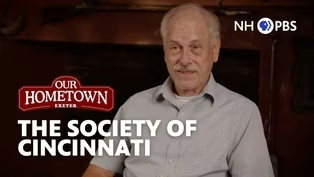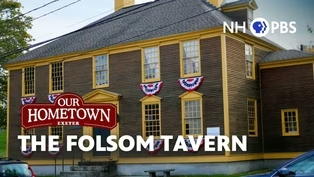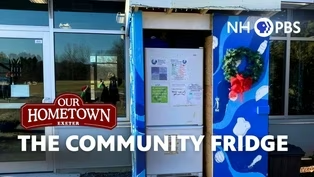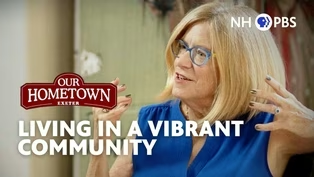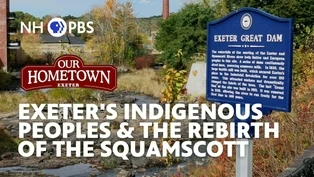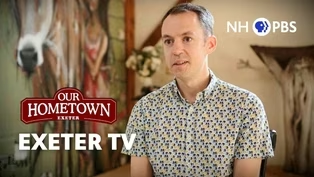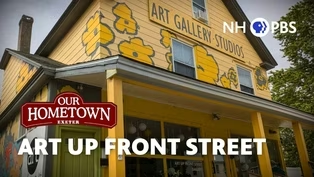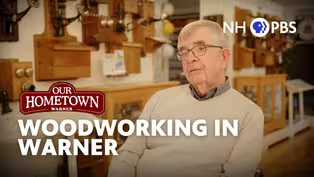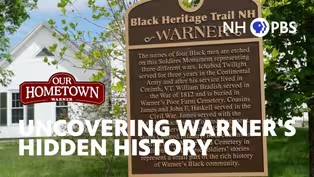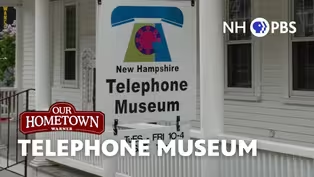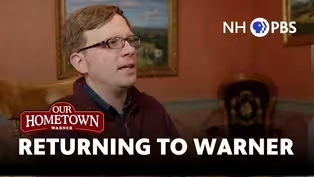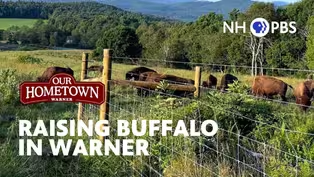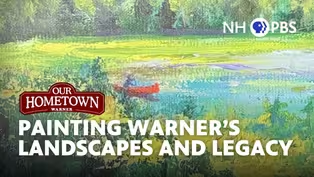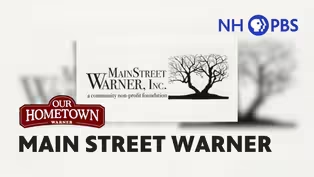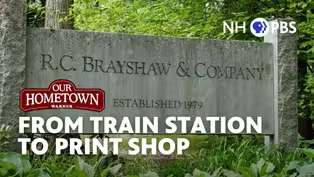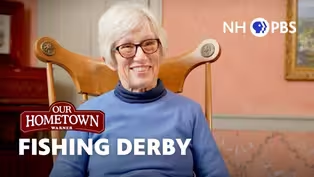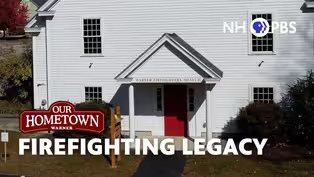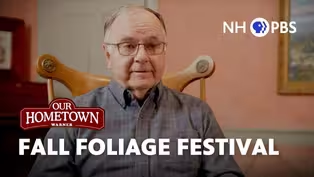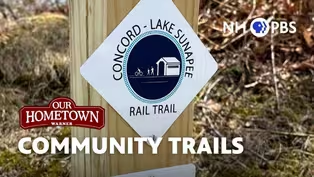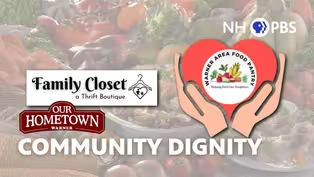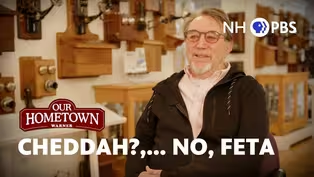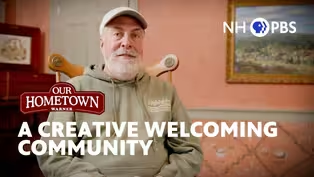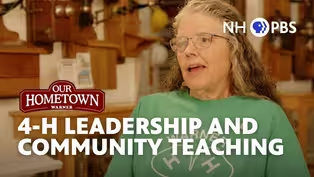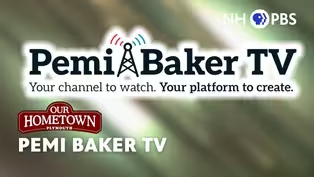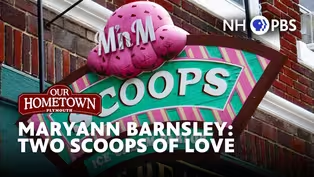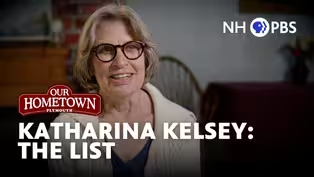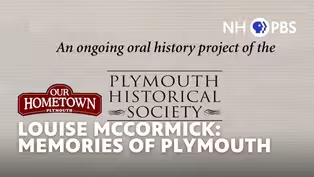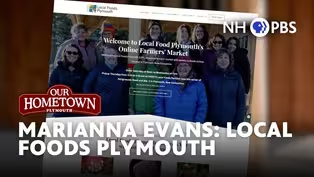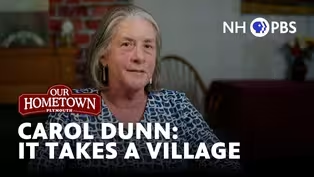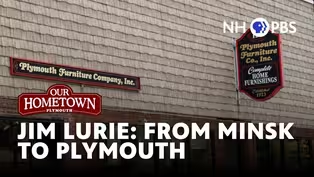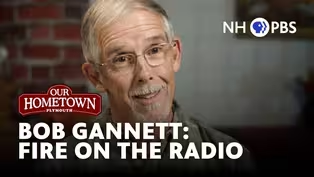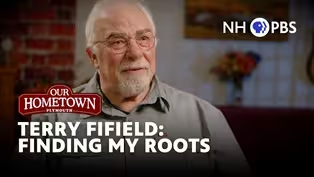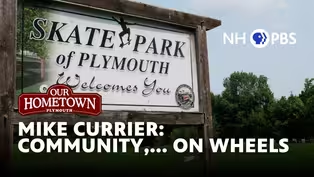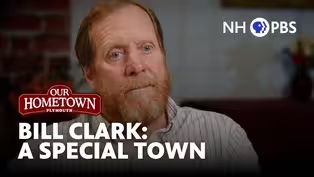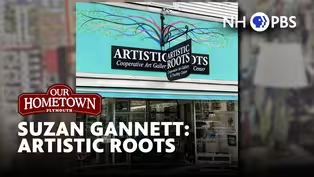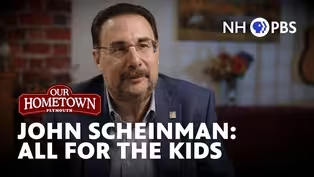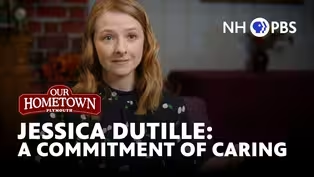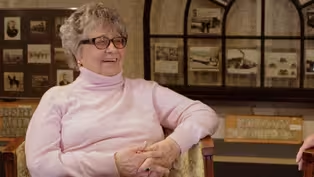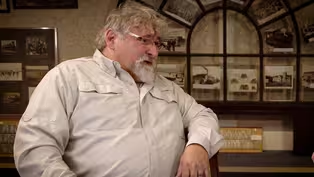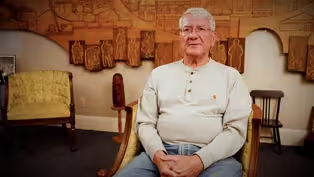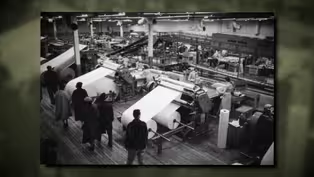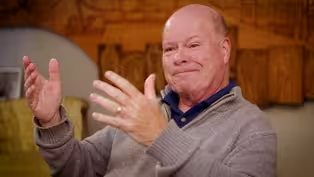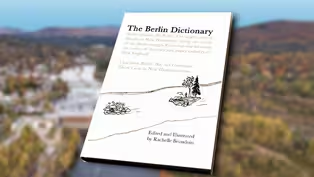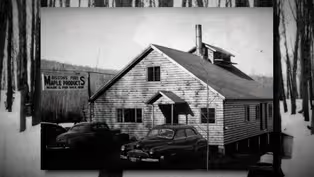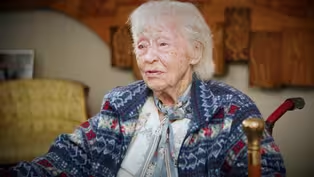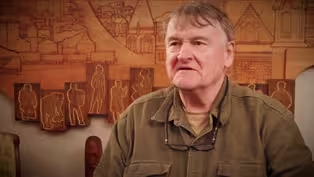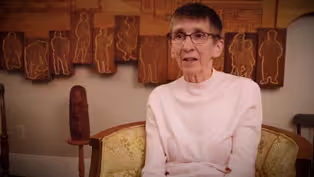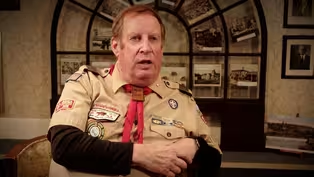Berlin | Aime Ramsey
Clip | 7m 49sVideo has Closed Captions
Aime tells the story of his immigrant grandfather, Francois Bisson, migrating from Quebec.
Aime tells the story of his immigrant grandfather, Francois Bisson, migrating from Quebec, and working in a number of enterprises, to support a large family.
Problems playing video? | Closed Captioning Feedback
Problems playing video? | Closed Captioning Feedback
Berlin | Aime Ramsey
Clip | 7m 49sVideo has Closed Captions
Aime tells the story of his immigrant grandfather, Francois Bisson, migrating from Quebec, and working in a number of enterprises, to support a large family.
Problems playing video? | Closed Captioning Feedback
How to Watch
is available to stream on pbs.org and the free PBS App, available on iPhone, Apple TV, Android TV, Android smartphones, Amazon Fire TV, Amazon Fire Tablet, Roku, Samsung Smart TV, and Vizio.
when I think about my grandfather, Francois Bisson, I think of the American dream.
He was born in September of 1873 in, St Leon's, Canada, Quebec.
And he came to New Hampshire.
He came to this country at a young age and he went to work in the woods.
think about this now.
You know, this guy comes here as a young man.
He he knows how to write his name.
All right?
he establishes a dairy farm and he's a broker for Wood for Brown Company.
He had 15 children that lived.
He had 17 children.
And all.
And he was married twice.
His first wife passed away during childbirth and she left him with six children.
One of them was like only one years old.
And he was not able to care for his children and run his farm and run his business.
He needed to provide, you know, for himself and his children, but he couldn't.
So he placed them in a convent in Island Pond, Vermont, there was a Catholic convent in Island Pond, Vermont, and that's where he placed his children.
And they were there for a few years.
He went back to Canada to meet my grandmother, my mother's mother, my mother's part of the second family and God bless her.
She met my grandfather once and agreed to marry him, and then the next time she saw him was when he went to get her and to get married.
then she took in all his children and had nine children with him and one of them was my mother.
And my mother was the second to the youngest.
my grandfather passed away in in May of 1939.
And, you know, my mother was 20 years old and he had a child.
His name was Charles, and he was the child born the year before my mother.
And that was 1918.
And that was the year of the Spanish influenza.
And my grandmother almost died during childbirth for him.
And my thought, my grandfather put him in the oven to try to save his life, to try to keep them warm, to save his life.
But he didn't make it.
He didn't last the day.
there were hard times, too.
You know, I'm just trying to imagine what life was like for them.
They didn't have any electricity.
Everything was done by hand.
Most of the virtually all the food was grown.
He used to farm a lot with his brother.
His brother was Lazarre Bisson and he owned the farm, the next farm down.
And they would often share equipment and share their horses and, you know, and work together.
And his brother Lazarre, who, as a side note, was the one who established Bisson Sugar House, which has recently retired.
But anyway, Lazaar and my grandfather also had a flock of sheep at that time.
It was still profitable for small farmers like my grandfather with small flocks.
You know, their primary, their primary business was not, you know, raising sheep.
It was kind of a it was like a sideline going, you know what I'm saying?
Just like just like, you know, he had his woods, you know, his brokering job and that along with his dairy farm, you know what I mean?
the main purpose of those sheep was to be sheared.
It was for the wool.
And I'm assuming the wool went to Manchester, you know, for, for the woolen mills.
Now the land where the sheep were pastured was a little up the road from the farmstead and that's where I lived.
during the depression.
My mother talked about that occasionally they would have hobos they would come and they would ask for a meal and they would ask for a place to stay.
And they'd ask to sleep in the barn.
And my grandfather and grandmother, my grandfather never turned them away and he wouldn't let them sleep in the barn for fear that they would smoke and set the barn on fire.
So he said, Yes, you can stay.
And he'd ask my grandmother to prepare them a meal if they had already had their meal, and she would prepare them a meal and they let them sleep on the floor in the kitchen next to the wood stove and my grandfather spent the night in a rocking chair in the kitchen just to be safe Yes.
I have an appreciation for hard work and what those people did, because I feel today we don't work nearly as hard as they did.
And and they were very successful.
They they kept at it, you know, and and they didn't lose their faith.
In the wintertime, my grandfather would pack up all his children and use a sleigh to go to church every Sunday.
It took it was it took part of the day to go to church because in the winter you were use he didn't use his car.
It was a sled.
And you had a team of horses.
And that was and it took a while to get to church and it took a while to get back.
And at night, every night, they said their prayers.
They prayed as a family.
They said the rosary.
And on my father's grandfather's deathbed, the last things he said to his family was to stay together, meaning to stay united as a family.
You know what I mean?
So to me, family means a lot.
You know.
But, you know, through hard work and perseverance, he was able to get through life and have a good life.
Exeter | The Society of Cincinnati
Video has Closed Captions
Clip | 6m 13s | Dana tells us about the genesis of the Society of Cincinnati in New Hampshire. (6m 13s)
Video has Closed Captions
Clip | 5m 57s | Rebeccah tells us about the beautiful architecture & rich history of the Folsom Tavern. (5m 57s)
Video has Closed Captions
Clip | 4m 11s | Alexis Cargill speaks about the Community Fridge; a self-serve food clearinghouse. (4m 11s)
Exeter | Living in a Vibrant Community
Video has Closed Captions
Clip | 3m 30s | Cathleen Toomey talks about moving to, and living in such a diverse, thriving community. (3m 30s)
Exeter | Indigenous Peoples & the Rebirth of the Squamscott
Video has Closed Captions
Clip | 6m 28s | Denise and Paul Pouliot tell us about the indigenous roots of many of the area names. (6m 28s)
Video has Closed Captions
Clip | 5m 21s | Bob Glowacky tells us about the many things that Exeter TV is doing to connect & build community. (5m 21s)
Video has Closed Captions
Clip | 4m 39s | Rose talks about the vibrant art community in Exeter, and how she started her studio & gallery. (4m 39s)
Warner | Woodworking in Warner
Video has Closed Captions
Clip | 2m 10s | Jim McLaughlin shares how woodworking deepened his bond with Warner. (2m 10s)
Warner | Uncovering Warner's Hidden History
Video has Closed Captions
Clip | 5m 7s | Discover Warner’s untold Black history with local historian Rebecca Courser. (5m 7s)
Video has Closed Captions
Clip | 6m 22s | Graham Gifford shares how Warner’s telephone museum came to life—surprising all. (6m 22s)
Video has Closed Captions
Clip | 2m 53s | Ian Rogers shares how travel and Warner’s community shaped his independent spirit. (2m 53s)
Warner | Raising Buffalo in Warner
Video has Closed Captions
Clip | 4m 47s | Brian & Kira Farmer share why they moved to Warner and raise buffalo on their farm. (4m 47s)
Warner | Painting Warner's Landscapes and Legacy
Video has Closed Captions
Clip | 2m 17s | Artist Mimi Wiggin paints her family’s legacy and Warner’s landscapes and traditions. (2m 17s)
Video has Closed Captions
Clip | 7m 57s | Neil Nevins tells about their non-profit, "Main Street Warner". (7m 57s)
Warner | From Train Station to Print Shop
Video has Closed Captions
Clip | 5m 56s | Jeremy reflects on the vibrant life surrounding Warner’s beloved train station. (5m 56s)
Video has Closed Captions
Clip | 2m 24s | Nancy Martin shares funny, fishy memories from Warner’s kids’ derby. (2m 24s)
Video has Closed Captions
Clip | 5m 1s | The rich history of Warner's fire department. (5m 1s)
Warner | Fall Foliage Festival
Video has Closed Captions
Clip | 2m | Ray Martin reflects on decades organizing the Warner Fall Foliage Festival and service. (2m)
Video has Closed Captions
Clip | 3m 52s | Tim Blagden shares how Warner’s abandoned rails became a community trail vision. (3m 52s)
Video has Closed Captions
Clip | 7m | Apryl Blood and Patty Anderson discussing their roles in the community. (7m)
Warner | Cheddah?,... No, Feta
Video has Closed Captions
Clip | 4m 34s | Author David Elliott speaks about moving to Warner. (4m 34s)
Warner | A Creative Welcoming Community
Video has Closed Captions
Clip | 4m 7s | As a radio guy and author, Matt Esenwine talks about coming to Warner. (4m 7s)
Warner | 4-H Leadership and Community Teaching
Video has Closed Captions
Clip | 5m 41s | Susan Jenna and Abigail R. reflect on decades of 4-H leadership and community teaching. (5m 41s)
Video has Closed Captions
Clip | 3m 15s | Dan Salzer and Jonathon Picard talk about Pemi Baker TV. (3m 15s)
Video has Closed Captions
Clip | 3m | Maryann Barnsley tells us about a childhood dream. (3m)
Video has Closed Captions
Clip | 2m 1s | Katharina Kelsey and her husband made a list, Plymouth checked all the boxes, and so much more. (2m 1s)
Plymouth | The Happiness Quest
Video has Closed Captions
Clip | 2m 34s | Dr. Marie Sanders relates what can happen when an entire town works together to discover happiness. (2m 34s)
Plymouth | Memories, Stories and Cake
Video has Closed Captions
Clip | 5m 41s | Patricia Hoyt came to Plymouth for college, launched her career here. (5m 41s)
Plymouth | Memories of Plymouth
Video has Closed Captions
Clip | 1m 55s | Louise McCormick is a townie. She grew up in Plymouth, and has spent most of her life here. (1m 55s)
Plymouth | Local Foods Plymouth
Video has Closed Captions
Clip | 3m 23s | Marianna Evans talks about Local Foods Plymouth, and how the pandemic helped to create a model. (3m 23s)
Video has Closed Captions
Clip | 2m 21s | Carol Dunn tells about how this amazing town bonded together to save her business on Main Street. (2m 21s)
Plymouth | From Minsk to Plymouth
Video has Closed Captions
Clip | 3m 41s | Jim Lurie tells us how in 1917, his grandfather travelled from Minsk, Russia, across Siberia. (3m 41s)
Video has Closed Captions
Clip | 1m 34s | Bob Gannett speaks about an interesting story unfolding as he was on the radio. (1m 34s)
Video has Closed Captions
Clip | 4m | Terry Fifield has lived in a lot of places, but found that the Plymouth area to be the best. (4m)
Plymouth | Community... on Wheels
Video has Closed Captions
Clip | 6m 14s | Mike Currier talks about the roots of the Plymouth Skate Park. (6m 14s)
Video has Closed Captions
Clip | 1m 45s | Bill Clark talks about, even with growth and progress, Plymouth is a special town. (1m 45s)
Video has Closed Captions
Clip | 4m 19s | Suzan Gannett talks about Artistic Roots, and the programs and passions that it has inspired. (4m 19s)
Video has Closed Captions
Clip | 2m 31s | John Scheinman shares how the skills needed in successfully coaching can be used. (2m 31s)
Plymouth | A Commitment of Caring
Video has Closed Captions
Clip | 5m 1s | Jessica Dutille talks about re-building community, after the pandemic changed the world. (5m 1s)
Video has Closed Captions
Clip | 4m 16s | Yvonne recalls growing up in Berlin, and speaking two languages in school. (4m 16s)
Video has Closed Captions
Clip | 6m 41s | Andre speaks to us about growing up in Berlin. (6m 41s)
Video has Closed Captions
Clip | 12m 40s | Walter tells us about Berlin's Skier/Soldier, Paul Petersen, and a love story. (12m 40s)
Video has Closed Captions
Clip | 3m 36s | Roland talks about working in every aspect of the paper industry, over 4+ decades. (3m 36s)
Video has Closed Captions
Clip | 4m 19s | Renney tells a couple of great stories about growing up in Berlin. (4m 19s)
Video has Closed Captions
Clip | 5m 37s | Berlin has a language all its own, and Rachelle decided to compile a dictionary of words. (5m 37s)
Video has Closed Captions
Clip | 4m 24s | Olive speaks about growing up in Berlin, in a family that owned Bisson's Sugar House. (4m 24s)
Video has Closed Captions
Clip | 3m 5s | Lorna recalls heading into Berlin on Friday nights, for shopping & meeting up with friends (3m 5s)
Video has Closed Captions
Clip | 3m 54s | Moving to Berlin was a dream come true for Haven, as he loved working in the woods. (3m 54s)
Video has Closed Captions
Clip | 2m 43s | Diane talks about going from a 45 year career in the banking industry. (2m 43s)
Video has Closed Captions
Clip | 6m 40s | Dennis tells the story of the history of boy scouts in Berlin, NH. (6m 40s)
Providing Support for PBS.org
Learn Moreabout PBS online sponsorshipSupport for PBS provided by:
